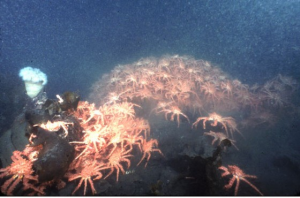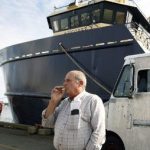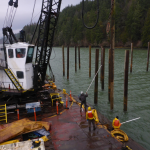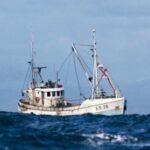Daily Archives: April 23, 2013
After son’s death, father criticizes lack of fishing industry oversight
![]() The 66 Washingtonians who died on the job in 2012 were honored at a memorial on Tuesday. A memorial bell was rung 66 times, once for each victim who died of a job-related illness or injury. But the father of a 22-year-old commercial fisherman who died says not enough has been done; he voiced frustration over what he called a lack of government oversight of the fishing industry. continued
The 66 Washingtonians who died on the job in 2012 were honored at a memorial on Tuesday. A memorial bell was rung 66 times, once for each victim who died of a job-related illness or injury. But the father of a 22-year-old commercial fisherman who died says not enough has been done; he voiced frustration over what he called a lack of government oversight of the fishing industry. continued
Work on fishing safety needed
It’s been well documented that commercial fishing can be deadly. In the past five years, more than 30 fishermen have died on the job in this province, according to the Fisheries Safety Association of Nova Scotia. From 2007 to 2010, Nova Scotia had slightly less than half of the country’s fatal fishing incidents at sea. continued
Grouper Fishing Opens May 1 In Florida Atlantic Waters
BrevardTimes.com – Species included in the recreational and commercial opening are gag, black, red, yellowmouth, yellowfin and tiger grouper; scamp; red hind; rock hind; coney; and graysby. State waters in the Atlantic are from shore to 3 miles out. continued
La. and Texas Fisheries Agencies File Joint Lawsuit challenging National Marine Fisheries Service Red Snapper Emergency Rule
As published in the federal register on March 25, the emergency rule would authorize the National Marine Fisheries Service southeast regional administrator to reduce the red snapper season in federal exclusive economic zone (EEZ) water s off Louisiana and Texas. continued
s off Louisiana and Texas. continued
Icicle Calls It Quits in Adak – cites regulatory uncertainty as the deciding factor
KUCB – Unalaska – Just two years after reopening, the seafood processing plant in Adak is shutting down. Icicle Seafoods didn’t return calls for comment , but in a press release, CEO Amy Humphreys cites regulatory uncertainty as the deciding factor. Fishing in the western Aleutians has been restricted in recent years to protect an endangered stock of Steller sea lions, and an anticipated division of the Pacific cod harvest between the Bering Sea and Aleutian Islands could also impact shore-based processors. continued
, but in a press release, CEO Amy Humphreys cites regulatory uncertainty as the deciding factor. Fishing in the western Aleutians has been restricted in recent years to protect an endangered stock of Steller sea lions, and an anticipated division of the Pacific cod harvest between the Bering Sea and Aleutian Islands could also impact shore-based processors. continued
Comment: Stop polluting before you worry about ocean garbage – Erik van Sebille
 Plans to clean up plastics from five massive ocean garbage patches may be good in theory, but are ultimately useless unless we stop polluting our oceans in the first place, writes Erik van Sebille. continued
Plans to clean up plastics from five massive ocean garbage patches may be good in theory, but are ultimately useless unless we stop polluting our oceans in the first place, writes Erik van Sebille. continued
Sitka’s Herring Population is Stronger than Ever
by Jake Ingman –  Last week, Andy Rauwolf sent a letter to Sitnews full of panic and misinformation. The first of many things that need to be corrected is his assumption that the closure of the herring fishery was because of a lack of herring in the area. That is false; continued
Last week, Andy Rauwolf sent a letter to Sitnews full of panic and misinformation. The first of many things that need to be corrected is his assumption that the closure of the herring fishery was because of a lack of herring in the area. That is false; continued
Seismic surveys are coming to the East Coast – This is the result in Tasmania’s scallop industry “Smart from the Start”?
the mercury.comau –  A PUSH to protect marine life from seismic surveys has been backed by Tasmania’s scallop industry, which says testing in Bass Strait in 2010 wiped out 24,000 tonnes of shellfish. At the same time a study is under way at the Institute of Marine and Antarctic Studies at the University of Tasmania to try to understand how seismic surveys may affect marine life, in particular scallops and rock lobsters. continued
A PUSH to protect marine life from seismic surveys has been backed by Tasmania’s scallop industry, which says testing in Bass Strait in 2010 wiped out 24,000 tonnes of shellfish. At the same time a study is under way at the Institute of Marine and Antarctic Studies at the University of Tasmania to try to understand how seismic surveys may affect marine life, in particular scallops and rock lobsters. continued
Overturning seal ban won’t create markets, insiders say
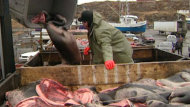 CBCNews – People involved in Canada’s commercial seal industry are expressing hope that they will be able to overturn a European Union ban on seal products, but some fur industry insiders doubt there is much of a market left for seal in Europe. continued
CBCNews – People involved in Canada’s commercial seal industry are expressing hope that they will be able to overturn a European Union ban on seal products, but some fur industry insiders doubt there is much of a market left for seal in Europe. continued
1 comment
Maine Governor LePage allows alewives bill to become law
Eighteen years ago, the Legislature approved a blockade that prevented alewives from running up the St. Croix River. In this June 4, 2005 file photo, alewives congregate in the Damariscotta Mills fishway, in Nobleboro,  Maine. An 18-year-old blockade on the St. Croix River will be lifted in a few days. (AP Photo/Robert F. Bukaty) In a historic decision that largely went unnoticed, that blockade will be lifted in a few days after Gov. Paul LePage opted not to veto L.D. 72. The bill takes effect Tuesday. The emergency legislation requires the state to ensure, by May 1, that the fishways on the Woodland Dam and the Grand Falls Dam be reconfigured or operated in such a way that “allows the unconstrained passage of river herring.” continued
Maine. An 18-year-old blockade on the St. Croix River will be lifted in a few days. (AP Photo/Robert F. Bukaty) In a historic decision that largely went unnoticed, that blockade will be lifted in a few days after Gov. Paul LePage opted not to veto L.D. 72. The bill takes effect Tuesday. The emergency legislation requires the state to ensure, by May 1, that the fishways on the Woodland Dam and the Grand Falls Dam be reconfigured or operated in such a way that “allows the unconstrained passage of river herring.” continued
Lobstermen, dealers likely to split marketing costs – Maine Lobster Promotion Council’s annual budget — now about $375,000 — is set to be increased to $3 million
![]() AUGUSTA – Lobstermen and dealers likely will pay equal shares of the cost of a new marketing effort designed to raise demand – and prices – for Maine lobster. continued
AUGUSTA – Lobstermen and dealers likely will pay equal shares of the cost of a new marketing effort designed to raise demand – and prices – for Maine lobster. continued
Swordfish Caught in Driftnets is California’s Deadliest Catch
indybay.org – The California drift gillnet fishery for swordfish and shark is the most dangerous fishery for whales and other marine mammals along the U.S. West Coast from California to Alaska. A new federal review of marine mammal bycatch in commercial fisheries found that the drift gillnet fleet is causing more harm to whales than ever. The 25 vessels operating in the drift gillnet fishery now accidentally capture and kill more whales and marine mammals than any other fishery along the U.S. West Coast. continued
James Odlin – There are fishing boats ready to come home to Maine and revitalize the state’s nonprofit Fish Exchange.
 Groundfishing vessels, many of which call Maine home, are forced to travel to Gloucester, Mass., to sell their fish and the lobster by-catch, putting at jeopardy Portland’s working waterfront and risking the permanent loss of what’s left of the groundfishing fleet. Last year, more than 126 million pounds of lobster were caught close to shore in traps. By contrast, less than 100,000 pounds were caught by groundfishing boats, less than one-tenthof 1 percent of the total. continued
Groundfishing vessels, many of which call Maine home, are forced to travel to Gloucester, Mass., to sell their fish and the lobster by-catch, putting at jeopardy Portland’s working waterfront and risking the permanent loss of what’s left of the groundfishing fleet. Last year, more than 126 million pounds of lobster were caught close to shore in traps. By contrast, less than 100,000 pounds were caught by groundfishing boats, less than one-tenthof 1 percent of the total. continued
U.S. Bureau of Reclamation apologizes to Klamath Basin biologists
The U.S. Bureau of Reclamation has backed off a plan to outsource jobs and apologies to seven Klamath Basin biologists who claimed scientific misconduct. Reclamation’s Mid-Pacific Regional Director David Murillo said the biolo
Mass. AG urges easing of fish limits – request that President Obama “ask” the National Oceanic and Atmospheric Administration to institute lesser catch reductions
![]() Gov. Deval Patrick has been urged by Massachusetts Attorney General Martha Coakley to request that President Obama “ask” the National Oceanic and Atmospheric Administration to institute lesser catch reductions than are expected on Gulf of Maine cod and other stocks for the fishing year that begins May 1. continued
Gov. Deval Patrick has been urged by Massachusetts Attorney General Martha Coakley to request that President Obama “ask” the National Oceanic and Atmospheric Administration to institute lesser catch reductions than are expected on Gulf of Maine cod and other stocks for the fishing year that begins May 1. continued


































